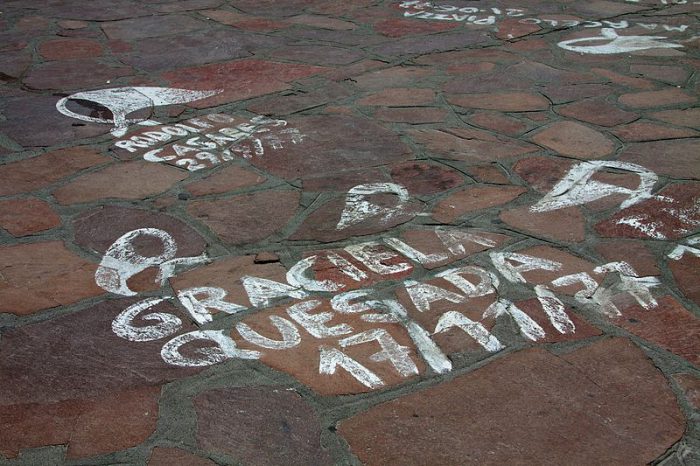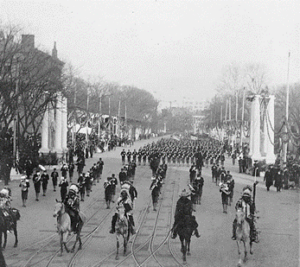

“There are important details but it is difficult to talk about them. I think about them and I repress them. They were undressed while being unconscious and when the flight commander gave the order, depending on the location of the plane, the hatch was opened and they were thrown out naked, one by one… As I was quite nervous about the situation, I almost fell and tumbled into the abyss… I stumbled and they grabbed me. – Navy Captain Francisco Scilingo 1
Navy Captain Francisco Scilingo was one of the many officers responsible for flying groups of the detained out to sea to dump the naked, unconscious bodies of leftists and members of the political opposition movement because of the belief that their actions were vital to save Argentina from communism.2
In the midst of the Cold War, the United States fought to prevent the fall of capitalism and contain the spread of communism. History has maintained a heavy focus on the fight for containment in Eastern Europe and Asia, but the fight, in reality, was spreading much closer to home. While the United States was fighting on the other side of the world, communism was knocking at America’s southern border and beginning to take root in Latin America, often seen as America’s backyard. This threat soon became a major concern for the United States as many high-ranking officials felt the United States, the safe haven for capitalism, was now at risk. Aligning with the United States’ fear of communism provided a number of Latin American countries good graces from the United States and carte blanche for any action deemed to contain communism within their own countries. Therefore, multiple Latin American nations came together and established what would be known as Operation Condor in the Southern Cone of Latin America; this operation was heavily supported and sponsored by the United States.3

On March 24, 1976, Argentina underwent a violent and brutal political shift from a constitutional republic to a military dictatorship under the leadership of Jorge Rafael Videla. Jorge Videla seized power from the Argentine government by staging a coup d’état that removed President Isabel Martínez de Perón, under the guise of a rise in violence, social unrest, and economic problems due to her presidency. Jorge Videla was the leader of the coup d’état along with other officers in the Argentine military, who had the backing from the United States. After assuming the position of President, one of Videla’s first actions was converting the constitutional republic into a military-led dictatorship with him at the helm.4
President Videla justified his actions of overthrowing the Perón administration by exclaiming that Perón’s government had lost its moral integrity and allowed the nation to fall to extreme economic and social unrest. President Videla believed it was his duty as a proud Argentinian to remove Isabel Perón from office and take control of the government so that, as the new leader, he could restore order to his nation in disarray. Argentina’s involvement in Operation Condor backed by the United States supported dictators like President Videla who committed heinous human rights violations claiming to repress communist threats. In fact, it was simply state terror sponsored by the United States under the guise of preventing the spread of communism. President Videla pushed strongly for unity in all sectors of life and believed that to overcome its internal struggles required all citizens in Argentina to share the same ideology. In order to suppress any resistance to his ideas, he assumed control of the government and led Argentina as a military dictatorship, with the goal of uniting the country around his beliefs, prior to allowing a safe return to democratic rule, at which time he might relinquish his control of the nation.5
The unity President Videla sought to achieve was not within reach, seeing as he could not control his people. President Videla chose to remove all those who did not agree with his administration. As President Videla’s reign continued, the voice of resistance grew louder, only increasing the number of lives that would be destroyed by him and his military. President Videla targeted any perceived resistance group that he felt was created to resist his rule. These were ordinary citizens, students, trade unionists, psychiatrists, writers, journalists, and artists. It was later discovered that President Videla and his military officials had specifically been targeting members of groups such as the Revolutionary Worker’s Party, the Marxist-Leninist Communist Party, and the Anti-Imperialist Front for Socialism.6 While these groups opposed the government, they were not the terrorists that President Videla claimed they were; these citizens were in fact peaceful and were not associated with the violent guerilla groups that took up arms against the regime. President Videla and his men suppressed the opposition and all forms of dissidence through violence, the government, and its military by enforcing suppression through the fear of detainment, torture, rape, and even murder.
The voices of those who chose to speak against the Videla administration were not only suppressed by the military officials; they were horribly vilified and ridiculed by the government. This vilification planted seeds into the minds of many citizens leading them to believe that those who were detained had deserved it, for they were brave enough to speak up. These seeds cracked the foundation resulting in a schism with three distinct groups: those who chose to speak up against the oppressive regime, those who remained silent out of self-preservation, and those who became compliant with the government, believing that those who were detained had deserved it.7

The criteria to become one of the disappeared, or simply be detained, tortured, and raped was not to be an extremist. President Videla and his military forces would target, and detain any and all voices who opposed them; even the possession of a pamphlet would result in detainment. These opposing voices were not extremists; in many cases, they were law-abiding citizens who felt the government had overstepped, and they were severely punished for it.8
The Videla administration should not have been able to do as much harm as they did for the five years that President Videla was in power. How was the Argentine government able to get away with the detainment, torture, rape, and murder of 30,000 people? The Argentine government and President Videla denied any and all accusations that they conducted raids, abductions, detainment, torture, or murder. Rather than assisting the parents and family members of the disappeared, police officials told families that they were not aware of the whereabouts of the disappeared and that none were in police custody. Instead of helping in the search for the disappeared, the police force would cynically suggest that parents should be better aware and keep a better eye on their children and loved ones. Despite claiming that they had not detained anyone, the military officials made the argument that if anyone was arrested, they must have done something to deserve it. While detained, they were tortured, and once unconscious, the military dropped their limp bodies from planes into the ocean where they died. As more and more people disappeared, citizens witnessed the disappearances, but feared repercussion and did not speak to avoid a similar fate. By remaining quiet they began doubting they witnessed anything at all. State terror gave rise to the concept of denial among people who chose to ignore the disappearances and remain silent to avoid becoming one of the disappeared. It became much safer to simply accept what was happening in the country, and less dangerous to simply “not see” what was happening around them.9 President Videla and his administration evaded accountability by instilling fear in everyone. This fear paralyzed all the Argentines enabling the government to intensify repression and suppression with impunity.

However, one factor the Videla administration failed to take into consideration was the power of a mother’s love. Every Thursday, in a square that bordered the Presidential Palace, the Metropolitical Cathedral, the National Bank, and the major museum, the mothers of the disappeared came together. The administration could only ridicule the mothers as they protested peacefully and quietly, bearing photographs and sharing the names of their missing sons, daughters, and family members in the Plaza de Mayo. At this location, it was difficult for them to be ignored, and every week, mothers protested silently and demanded that the government stop the detainment, torture, and murder of their children. Their demands for their children to be returned to them alive soon came to international attention and brought a wave of outrage. Their courage and love for their missing children inspired similar movements in other parts of Latin America that were experiencing similar waves of repression.10
In 1978, the FIFA World Cup took place in Argentina, bringing a large contingent of foreign reporters with the priority to cover the soccer tournament. The government thought that they could control the image of the country projected during the World Cup to prove that Argentina was in fact a nation of order, focusing on the false image crafted by the administration, yet it cracked, revealing the horrors lying within. In Argentina, some reporters noticed the mothers as they protested peacefully in the Plaza de Mayo. Reporters learned why the mothers were protesting and began reporting on the mother’s cause. As a result, the mothers soon garnered the attention of the international community. People around the world and throughout Argentina uncovered the falsehood of the government’s characterization of the mothers as madwomen protesting without a cause. The world began to see clearly and reinterpret the demonstrations by the mothers. The life to the movement provided a new lens, a more powerful and familiar lens of human rights that shed light on the disappeared. These mothers were now viewed as aggrieved and outraged mothers who were risking their own lives and safety for the return of their disappeared children. Therefore, these women were not insane, but insanely brave. This earned them respect and developed international recognition and standing for their protests. While the world saw clearly the struggles the mothers were facing and recognized that these protests had due cause, the mothers fought on with a renewed drive and energy. They were no longer in this fight alone; they were a strong political force with the backing of others from around the world, and their issue was now on the international stage.[11. Amy K. Kaminsky, Argentina: Stories for a Nation (Minneapolis: University of Minnesota Press, 2008), 160.]
The bravery and courage of the Mothers of the Plaza de Mayo soon intensified international scrutiny of the state and painted a new, more realistic image of the events occurring in Argentina to the world. Their movement spread and soon provided a polar opposite alternative to the Argentine government and the struggle for what it means to be Argentinian. Thanks to the Mothers of the Plaza de Mayo, and the universal language of motherhood to which they appealed, the world learned about the brutal campaign of repression led by Videla’s Administration. Prior to this, President Videla characterized Argentina as a nation of order, morality, and stability, but the movement of the mothers sounded the alarm that Argentina had become a dysfunctional nation engaged in a campaign of massive human rights violations.11
The title “disappeared” does not only cover those who were detained, tortured, and murdered by the government; it also incorporates the supposed 500 children who were ripped from the hands of their parents after detainment and placed in the care of military officials and families that were supportive of the government. While progress has been slow in finding these missing children, there have been major strides in identifying and reunifying these children with their families. Through the use of DNA testing, the Grandmothers and Mothers of the Plaza de Mayo have been able to identify over 100 of the supposed 500 children who were taken from their detained parents, while their parents may have been executed by the government; other members of their families are able to share the memory of their parents.12

In the years that have followed the military dictatorship of Jorge Rafael Videla, victims, historians, and activists have all struggled and confronted a formidable lack of documentation of the 30,000 people who disappeared. After the end of the dictatorship and the return to democracy in the region, several former centers of detention, torture, and extermination were reintegrated into daily life for new purposes, erasing any shred of history these buildings contained. These centers were converted into schools, hospitals, and even police stations. Some were torn down in the hopes of forgetting the traumatic history of these sites. Fortunately, after decades of protests and demands from the Mothers of the Plaza de Mayo, there have been steps towards a memory-building agenda in many parts of the country.13 Museums and memorial sites like Memory Park were established throughout the country. Memory Park lies on the bank of the Rio de la Planta in Buenos Aries and has a feel and aesthetic similar to that of the Vietnam Memorial in Washington D.C. While there are many diverse sites to commemorate the disappeared in Argentina, Memory Park provides a location for mourning, other sites serves different purposes. The centers of detention, that were converted or demolished provide forensic evidence for activists who seek a better understanding of what occurred there and who was tortured there. There are sites such as the Naval School of Mechanics, that reference in detail the kidnapping, torture, and exterminations that took place during those horrific years. The tireless efforts from activist manage to preserve these sites to call attention to the people who were targeted and murdered by the government. Other than these historical sites, the disappeared are still remembered in the continuation of protests and through pop-up art depicting the white shawl that signified the Mothers of the Plaza de Mayo along with the names of the disappeared.14

Argentina is similar to many countries in that the current political climate has been polarized between left-leaning and right-leaning. While the Mothers of the Plaza de Mayo have been fighting for remembrance and for the creation of permanent spaces to commemorate the disappeared, the right has pushed back. After the events of the Dirty War, there was a section of Argentinians who were compliant with the government and believed that those who disappeared deserved it, as such these citizens have criticized the efforts of remembrance as political propaganda. Similarly to how the citizens are divided, the government has also remained polarized. While there have been multiple administrations that have actively supported an agenda of remembrance and a focus on bringing justice for the disappeared, the fight has remained difficult in and out of court. Some historical sites, such as detainment facilities were demolished in an effort to wipe historical records clean, and countless court cases were thrown out. But despite these struggles, some government and military officials have been brought to justice, and documents have emerged showing a clearer involvement of the Argentine government despite initial denials.15

President Videla with his authoritarian government and military killed over 30,000 people. Each person detained, tortured, raped, and murdered deserves to be remembered. Their lives were lost as a result of an administration that severely punished all those opponents, under the guise of stability. The administration long denied its role in the horrendous human rights violations. The fight for remembrance will continue and persist until the identities of all who disappeared are known, and those who were responsible are brought to justice for the crimes they committed. This period of history presents an indelible stain on Argentina’s history, no matter how much those who try to label the movement as political propaganda try to deny history. The names and images of those who disappeared in those horrific years will live on in the voices and actions of the Mothers and Grandmothers of the Plaza de Mayo. While the voices of the disappeared may have been silenced, their names and images speak volumes and will continue speaking loudly for years to come.
- Antonius C. G. M. Robben, “How traumatized Societies Remember: The Aftermath of Argentina’s Dirty War,” Cultural Critique, no. 59 (2005): 120. ↵
- Antonius C. G. M. Robben, “How traumatized Societies Remember: The Aftermath of Argentina’s Dirty War,” Cultural Critique, no. 59 (2005): 120-121. ↵
- Paul H. Lewis, Guerillas, and Generals: The “Dirty War” in Argentina (Praeger, 2001), 124-125. ↵
- Paul H. Lewis, Guerillas, and Generals: The “Dirty War” in Argentina (Praeger, 2001), 125-126. ↵
- Paul H. Lewis, Guerillas, and Generals: The “Dirty War” in Argentina (Praeger, 2001), 126-128. ↵
- Kristi M. Wilson, “Building Memory: Museums, Trauma, and the Aesthetics of Confrontation in Argentina,” Latin American Perspectives 43, no.5 (2016): 114. ↵
- Amy K. Kaminsky, Argentina: Stories for a Nation (Minneapolis: University of Minnesota Press, 2008), 159. ↵
- Amy K. Kaminsky, Argentina: Stories for a Nation (Minneapolis: University of Minnesota Press, 2008), 159. ↵
- Amy K. Kaminsky, Argentina: Stories for a Nation (Minneapolis: University of Minnesota Press, 2008), 158-159. ↵
- Amy K. Kaminsky, Argentina: Stories for a Nation (Minneapolis: University of Minnesota Press, 2008), 159-160. ↵
- Amy K. Kaminsky, Argentina: Stories for a Nation (Minneapolis: University of Minnesota Press, 2008), 160-161. ↵
- Ben Fox, DNA test ends a mystery of Argentina’s ‘dirty war’ (Associated Press, 2014). ↵
- Kristi M. Wilson, “Building Memory: Museums, Trauma, and the Aesthetics of Confrontation in Argentina,” Latin American Perspectives 43, no.5 (2016): 113-114. ↵
- Kristi M. Wilson, “Building Memory: Museums, Trauma, and the Aesthetics of Confrontation in Argentina,” Latin American Perspectives 43, no.5 (2016): 114-115. ↵
- Kristi M. Wilson, “Building Memory: Museums, Trauma, and the Aesthetics of Confrontation in Argentina,” Latin American Perspectives 43, no.5 (2016): 114. ↵




34 comments
Maria Fernanda Guerrero
Congratulations, for having written such an amazing article. I loved your title. I was not familiar with Argentina’s dirty war so thank you for your enlightenment. It’s inspiring to say groups like Las Madres de Plaza de Mayo found a way to channel all that sadness and anger into fighting for truth and justice. This article sheds light on a dark chapter in history that must never be forgotten. Congratulations and thank you for your hard work.
Fernando Milian
It is always good to find such good articles that deal with issues from our American region. Although Argentina is geographically distant, and we are separated from it by language and other cultural distinctions, the issue at hand deserves our reflection. As the text points out, the fight to stop the spread of communism in Latin American countries, as part of the Cold War, caused the United States to support a series of military dictatorships that caused more damage than the damage they were intended to prevent. Fortunately, today, Argentina is a democratic country where the rule of law predominates, and its rulers recognize the importance of remembering the victims of this massacre.
Nicole Estrada
The article skillfully depicts Argentina’s journey from democracy to military dictatorship, emphasizing US involvement in Latin America during the Cold War. The regime’s use of the World Cup to boost Argentina’s international standing is fascinating. Despite South America’s history of corruption, Argentina’s perseverance is reflected in its attempts to memorialize victims and avoid the recurrence of past bloodshed through memorials, showcasing the country’s development despite obstacles. I personally do not know much about this topic but can appreciate this article! Well done!
Gaitan Martinez
I loved the beginning, the opening followed through on grabbing my attention. The whole situation is very sad, but I’m glad we are exposing many truths. I’m not surprised that this whole ordeal was a result of communism. America has a history of getting involved with other’s affairs over communism. Another example would be the Salvadoran Civil War: where America helped the Salvadoran government only because the civilian rebels had socialist beliefs.
Eugenio Gonzalez
First of all, congratulations on your winning article. The author does an excellent job of explaining the transition of Argentina from a constitutional republic to a military-led dictatorship. I like how the author points out the interventionism of the U.S. in Latin America during the cold war. It was interesting to see how the military dictatorship used the world cup to manipulate the international image of Argentina.
Samuel Vega
Aaron congratulations on the dual recognition of “Best Descriptive Article” and “Best Article in the Category of Human Rights.” You have done an outstanding job of presenting a topic with detailed information. I was not familiar with the actions of President Videla and how to gain control of the governments he silenced anyone with opposing views in such horrific ways. I can’t imagine the fear that the Argentinians had, where they did not speak up for the wrongs that they knew were being committed. The unjust continues with the new government not properly recognizing the 30,000 who disappeared through a memorial.
Carlos Hinojosa
This was a really good article and it showed a clear image of how this dictator came to power and eventually used this power to do horrible things. I never even knew this happened and it honestly saddens me that at one point our country supported this dictator just because he didn’t like Communism. Great article which gave a clear image of what you were aiming to talk about.
George Assaf
This was a really good article I like how the author worded the topic and kept me engaged throughout the whole piece, truly amazing to read. Before this article I hade a vague idea about the topic because of family members from Argentina but I did not know all of the details and all of the things this article explains well.
Meghann Peace
I LOVE the Mothers and the Grandmothers of the Plaza de Mayo. Thank you for writing about them, and about the atrocities that they have protested and continue to protest. Everyone should know about los desparecidos. Just last night, in fact, I watched “La historia oficial”. It’s a really old movie, made in 1983, just as the regime was falling, and it’s about an upper-class Argentine woman who starts to realize that her adopted daughter might be the child of a desaparecida. Thanks to movies like that, the mothers and the grandmothers, and articles like this, we can make sure that Argentina’s desparecidos are never forgotten.
Camryn Blackmon
The quote you used to start your article was a great way to catch the readers’ attention. It made me want to learn more about what was being discussed. I liked that you provided the historical context of United States intervention during the Cold War in Latin America. The interventions still have terrible impacts today.